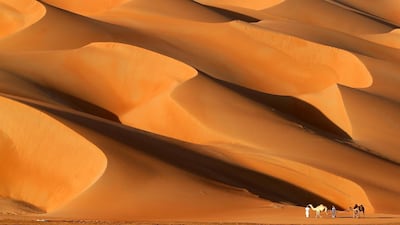For Abu Dhabi, it's not easy being green. Commercial agriculture has been a coveted measure of modernity in the Arabian Gulf since the 1950s, but it is one benchmark that has had mixed success over the decades.
Now, Chinese technology that transformed the sands of the Gobi desert into lush fields of sunflowers could turn the dunes of Sweihan into rolling meadows within six months.
Researchers from Chongqing Jiaotong University will be given 10 square kilometres of Abu Dhabi to cultivate desert grasses, vegetables and shrubbery in the spartan interior of the emirate, where 85 per cent of the land is classified by the government as "naturally degraded".
In a plush Abu Dhabi hotel yesterday, researcher Wang Min showed UAE government officials slides and videos of flattened dunes in inner Mongolia being tilled by tractors and bushy chaffs of sorghum blowing in the wind.
"You can see the grass here and the crops, more than 40 types of crops, are growing prosperously in the sand," she said. "This is after only four months of soilisation."
Soilisation is what the researchers call their technology. The presentation was short on details about how it worked, instead it emphasised its reliance on physics instead of chemicals.
"It's a mechanical manipulation, not chemical," said Yi Zhijian, the university's vice president.
Abu Dhabi is an opportunity to see if the technology can be applied in commercial agriculture in one of the most extreme climates on Earth. If successful, the project will be developed by the company Chongqing Earthskin Eco-technology. Yesterday, this company signed an agreement with Mawarid Holding, which manages Abu Dhabi forests and much of its agricultural production.
Mawarid Holding will fund the project, which has the support of the federal government.
"The way that you managed to transform huge areas of the desert into cultivated land and green areas is a model that we looked at in a very interested manner.
"We're looking forward to implementing it here in the UAE," said Dr Thani Al Zeyoudi, the Minister of Climate Change and Environment after the presentation.
Federal officials hope the technology could promote food security. The Government has identified 20 high priority crops, including wheat, rice, types of livestock fodder and varieties of dates and mangoes.
“We’re going to give full support to ensure the success of this project," said Dr Al Zeyoudi.
____________
Read More:
Special Report: Abu Dhabi's dwindling water reserves charted in worrying Sorbonne research
The future health of our forests requires prudent investment now
Wheat and chaff: Arabian Gulf's previous attempts of cultivating crops
____________
The technology has been in development since 2009 and comes to Abu Dhabi after successful desert steppe reclamation and agricultural cultivation in China's Ulan Buh Desert in the past two years.
The university presented photographs of ripe radishes, watermelon, aubergine and potatoes harvested in dunes identical in appearance to those of Al Ain.
"It's one of the strategic options when it comes to producing our own food locally," said Dr Al Zeyoudi.
"As you all know more than 85 per cent of our food comes from abroad so one of the main pillars for food security is to ensure that we do produce certain crops here in the UAE."
Both governments consider it beneficial to the Belt and Road Initiative, a series of pan-Asian corridors linking China to Europe.
"We aim to serve the Belt and Road initiative," said Dr Zhijian. "You see there are a lot of countries along the Belt and Road that are suffering from [desertification] and which are in need of soilisation technology."
To date, experiments in China have been conducted in sands watered by aquifers and piped water. Abu Dhabi would test on how it responds in highly saline water and salty soil. The type of crops and experimentation area are yet to be decided.
In stage one, researchers will set up an ecological and agricultural plan for large-scale commercialisation and application.
Stage two will be a two to three-year experiment. It is only at this stage that researchers will be able to determine how much the system will cut expenses and reduce water consumption.
Preserving these resources is a national priority. About 8,000 farms across the emirate have been abandoned because of increasing salinity and salty soil, both of which are considered non-renewable resources.
Dr Al Zeyoudi hinted that related projects will be announced soon. China, he said, was a logical partner.
"Soil is one of the big issues that the whole world is facing and techniques by Chinese researchers and institutions are going to have a huge impact globally, not only in the UAE.
“Desertification is becoming a global challenge that everyone has to work towards.”

